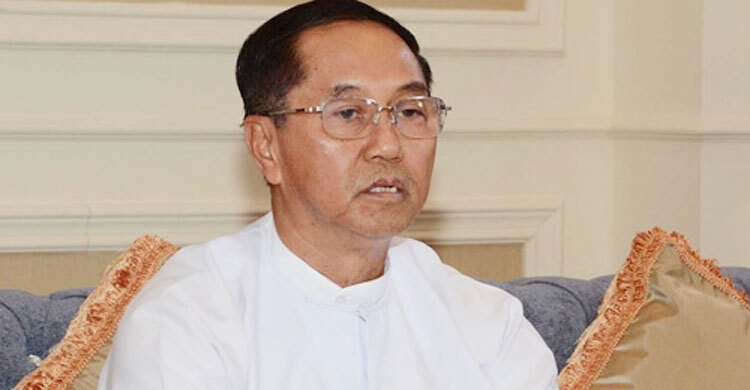Unruly Rulers
| Date :14-Jan-2022 |

By Sankar Ray :
With a puppet acting President MyintSwe, the erstwhile first Vice President of Myanmar, the military leadership has christened its increasing reign of torture to throttle civil liberties as “defensive people’s war” but gets unnerved. Junta forces resorted to looting of civilian possessions, carried out arson attacks, and destroyed civilian property, including food, medicine, and aid supplies intended for displaced civilians.
A MYANMAR junta court in Naypyitaw found 76-year-old civilian leader and Nobel Peace laureate Aung San SuuKyi guilty on at least three charges and sentenced her to four more years in prison- two years for the possession of unlicensed walkie-talkies, and two years for breaching coronavirus curbs, according to legal sources. With numerous city-dwellers fleeing towards jungles in combat mood, the Army leadership gets isolated. The more the isolation, the more oppressive – to describe the state of unruly rulers in Yangon. Tatmadaw, the Pentagon of Myanmarese junta drafted a constitution laying down the conditions for the country’s democratic reforms excluded her from the presidency because she married a UK citizen and her two children are British. Min Aung Hlaing, chairman of the State Administration Council since seizing power, keeps frantically trying to justify his coup by claiming fraud in the November 2020 elections that re-elected SuuKyi’s National League for Democracy (NLD) party in a landslide. She and NLD deny all charges, calling the accusation as wholly fraudulent. The NLD leaders are on trial in a Kangaroo court and she might be sentenced to a total of more than 100 years in prison if she is found guilty on all the counts against her.
Her lawyers were ordered not to talk about her case last October. The election commission too found no evidence of wrongdoing in the poll. There are tweets defying diktats of hardcore police state. One in a random picks states, ‘This is the second set of charges on which #AungSanSuuKyi has been sentenced. Many more hang over her. The Tatmadaw has one goal: dismantle the NLD and keep ASSK out of politics. They are following through, and millions are suffering as they do.’ Alongside the red-eyed Tatmadaw goes massacre of innocent civilians including children. Involuntary displacement of over 230,000 civilians, imprisonment of at least 26 journalists and treating ethnic communities as enemies are features of ‘counter-revolutionary Tatmadaw. Fortify Rights, a human rights defender body in a tell-tale investigative report, released in the second week of November 2031 cited human rights violations that were war crimes.
“The Myanmar military junta blocked lifesaving humanitarian aid for forcibly displaced civilians … by arbitrarily arresting aid workers, destroying food stocks, confiscating aid, and other ongoing acts that may constitute war crimes.” The military dictator regime ‘poses a threat to regional peace and security. UN and ASEAN member states should urgently support emergency cross-border aid for the displaced and ensure accountability for the junta’s heinous crimes, said its regional director Ismail Wolff. It urged the Governments of Thailand, India, China, and Bangladesh to “immediately authorise humanitarian agencies to provide cross-border aid to growing numbers of civilians in need in Myanmar.” Tatmadaw targets ethnic groups that are up in arms –literally too – among 139-plus ethnic communities. Among them prominently are Karen (ethno-linguistically Sino-Tibetan), Christian Karenni, Rakhine (or Arakanese) and most of the 33 constituent ethnic communities of Shan national ethnic race. Ever since the coup took place in February, communal groups have been taking up arms as never before to press grievances for which they have found no other recourse. Now ethnicity and conflict are tightly interlinked in Myanmar.
The world around had squarely condemned Christmas-eve raid at Pray Meh, village in Hpruso township in southeastern Kayah State where Christian Karenni ethnic group comprises the majority when resident Christians were planning to celebrate in a nearby church to pray for peace. At two in the morning on 24 December they were awakened by the sound of drones flying over the township. Had Sir Winston Leonard Churchill who described ‘the Great Calcutta Killing of 1946’ as ‘sanguinary convulsion’ been alive today, he might have coined another memorable term for the increasingly isolated military junta Tatmadaw of Myanmar that keeps killing civilians including children, ethnic people and even journalists. The only global power that unethically shields Tatmadaw is China which blocked the condemnation of coup d’etat in Yangon at the United Nations in February this year. The two countries have earned the infamy of being the topmost jailors of journalists. By the end of 2021, at least 26 journalists were jailed under seditious pretexts.
The junta whose official name is National Unity Government strengthens the perception that state terrorism is the most rising threat to humanity. Even health workers are often been terrorised as over 355 attacks and threats were made in the first ten months under army rule targeting against health workers, facilities, and transports in Myanmar. With a puppet acting President MyintSwe, the erstwhile first Vice President of Myanmar, the military leadership has christened its increasing reign of torture to throttle civil liberties as “defensive people’s war” but gets unnerved. Junta forces resorted to looting of civilian possessions, carried out arson attacks, and destroyed civilian property, including food, medicine, and aid supplies intended for displaced civilians.
Resistance too spreads in semi-urban and rural areas with hundreds of civilians staying in jungles and preparing for retaliation. In Kayah State and neighbouring townships in southern Shan State, the Karenni Nationalities Fund, comprised of several newly-formed armed groups, and the Karenni Army, an ethnic armed rebel organisation, have been waging non-traditional warfare tactics to counter the military’s force. The Army responded by attacking people, mostly unarmed, made airstrikes in Kayah and southern Shan, the military has attacked entire communities with airstrikes, arson, and indiscriminate shelling and gunfire, while blocking civilians’ access to basic necessities — following the so-called “four cuts” strategy to impose life-threats to it has used for decades to destroy the support base of ethnic armed organisations. (IPA)